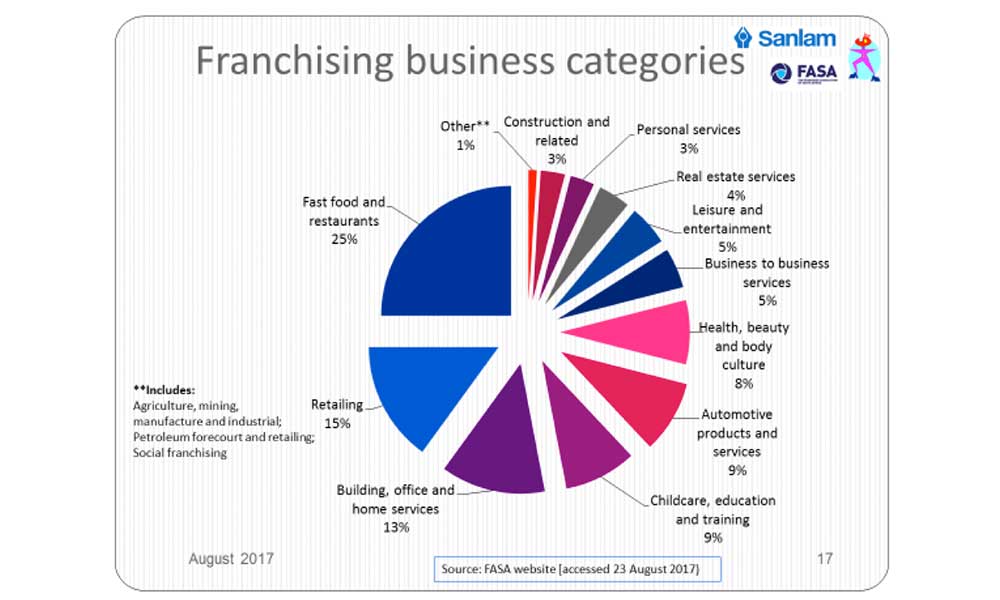The Franchise Association of South Africa (FASA) is delighted to announce the establishment of a Food Franchise Forum representing the majority of the household names in the casual dining and quick service restaurants (CDQSR) sector.
Based on 2016 figures, the franchise sector as a whole generated R587 billion in sales; this amounts to a significant 13.3% of South Africa’s GDP. Of this, the CDQSR segments contributed 29% of the total. The sector also employs some 65,500 people, the vast majority of whom were previously untrained individuals who otherwise stood little chance of finding employment in the formal economy.
More than six decades have passed since the CDQSR sector spearheaded the development of modern-day franchising. Franchising has subsequently made strong inroads into a dozen or so other industries, yet recently published research confirms that the CDQSR sector continues to play a dominant role in franchising as the chart below illustrates.
Whilst the Franchise Association of South Africa (FASA) operates under a government gazetted Code of Ethics for its 17 different sectors, the development of a Food Franchise Forum within FASA to liaise specifically on matters that have the potential to impact on the sector is an important step in the challenging food environment. The Forum is bound by a supplementary code of ethics for the franchised food sector and will adopt a series of monitoring measures by its measures.

More than six decades have passed since the CDQSR sector spearheaded the development of modern-day franchising. Franchising has subsequently made strong inroads into a dozen or so other industries, yet recently published research confirms that the CDQSR sector continues to play a dominant role in franchising as the chart below illustrates.
Whilst the Franchise Association of South Africa (FASA) operates under a government gazetted Code of Ethics for its 17 different sectors, the development of a Food Franchise Forum within FASA to liaise specifically on matters that have the potential to impact on the sector is an important step in the challenging food environment. The Forum is bound by a supplementary code of ethics for the franchised food sector and will adopt a series of monitoring measures by its measures.
Indications are that the food sector will continue on its growth trajectory. This is of particular importance in the South African context because it creates real, value-creating opportunities for the establishment of sustainable small enterprises under franchise arrangements and further job creation. Moreover, the sector makes an important contribution to South Africa’s vibrant tourism industry.
According to Vera Valasis, Executive Director of FASA, “It is common knowledge that our sectors find themselves under increasing pressure emanating from an ever-growing number of legislative and regulatory interventions. This is not a specifically South African phenomenon. Similar roadblocks are popping up in other parts of the world, with well-documented developments in the US and the EU being cases in point. Some of the regulations these countries have enforced, or are considering, are onerous and threaten the very survival of many long-established food service operations.”
Chairperson of the Food Forum, Nazrana Hawa of Spur, which spearheaded the establishment of the forum under the auspices of the Franchise Association of South Africa comments, “Raising awareness about issues affecting our sector requires a united voice and a credible representative body mandated to speak on behalf of the sector.”
Examples of recent issues causing concern to operators in South Africa’s CDQSR sector range from the recent food safety scare, draft liquor policy and proposed smoking regulations. Other key projects identified for consideration are new regulations for food licences, labelling regulations, proposed requirements around gas installations, tax laws that may affect the sector and developments around landlords and rentals and the POPI Act.
According to Hawa, “Experience tells us that representations submitted to government by individual brands, no matter how well-reasoned, are unlikely to achieve the desired results. For the sector to be heard it needs to do so through a credible, representative body, mandated to speak on the CDQSR sector’s behalf.”
Hawa continues, “As FASA is a well-established, representative body of long-standing, with strong local and international linkages and enjoying good relations with relevant government departments, members felt that setting up the proposed body under its umbrella makes perfect sense. For the initiative to achieve its objectives, however, will require buy-in by most, if not all, of the credible franchised brands and from suppliers to the industry.”
Hawa notes, “Given that government has gazetted FASA’s Code of Ethics and has expressed the intention to adopt the code for broader use, further cements FASA’s standing as franchising’s sole representative vis-a-vis government and other stakeholders. The need for and value of the Forum is validated by the fact that major franchise companies have come on board including: Famous Brands, KFC, Nando’s, Taste Holdings, Fournews, Hot Dog Cafe, Barcelos, Pizza Perfect, Adega, Mike’s Kitchen, King Pie, Jimmy’s Killer Brands, Chicken Xpress, Kauai and OBC Chicken & Meat.
Hawa clarifies, “While FASA will continue to represent the interests of franchisors across a variety of business sectors, including the restaurant sector, the FASA Food Franchise Forum will represent the sector-specific and clearly-defined interests of the CDQSR sector only.”








